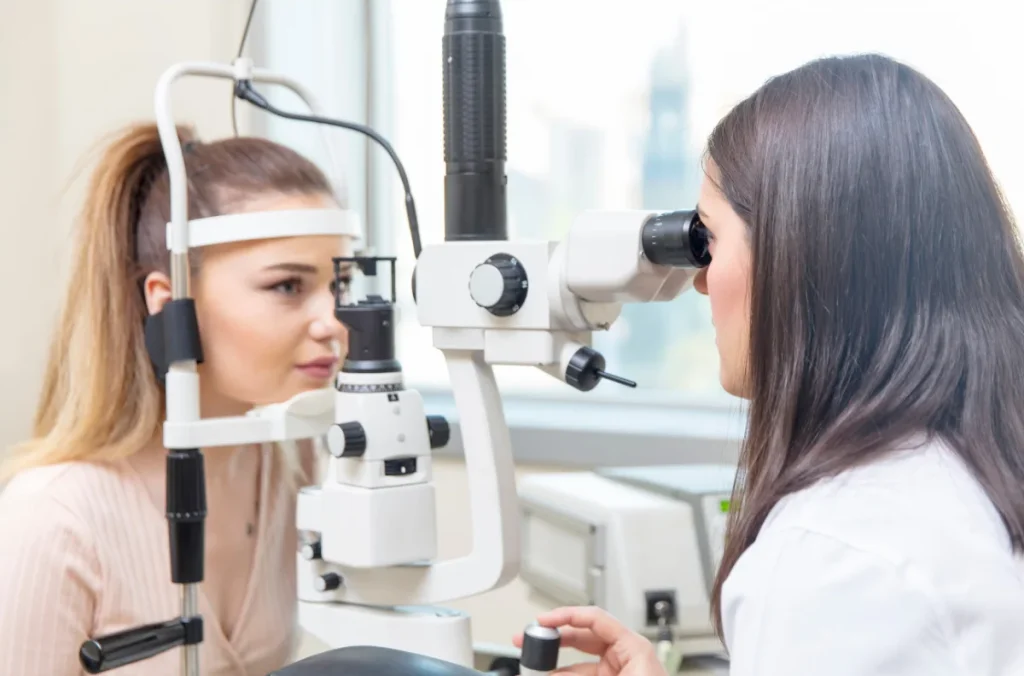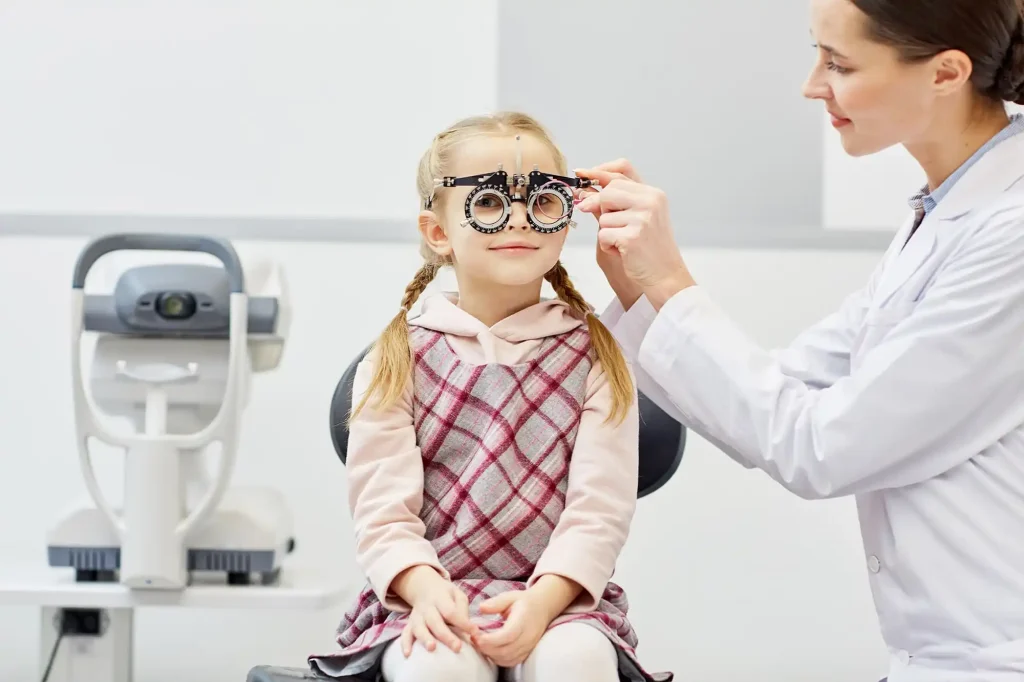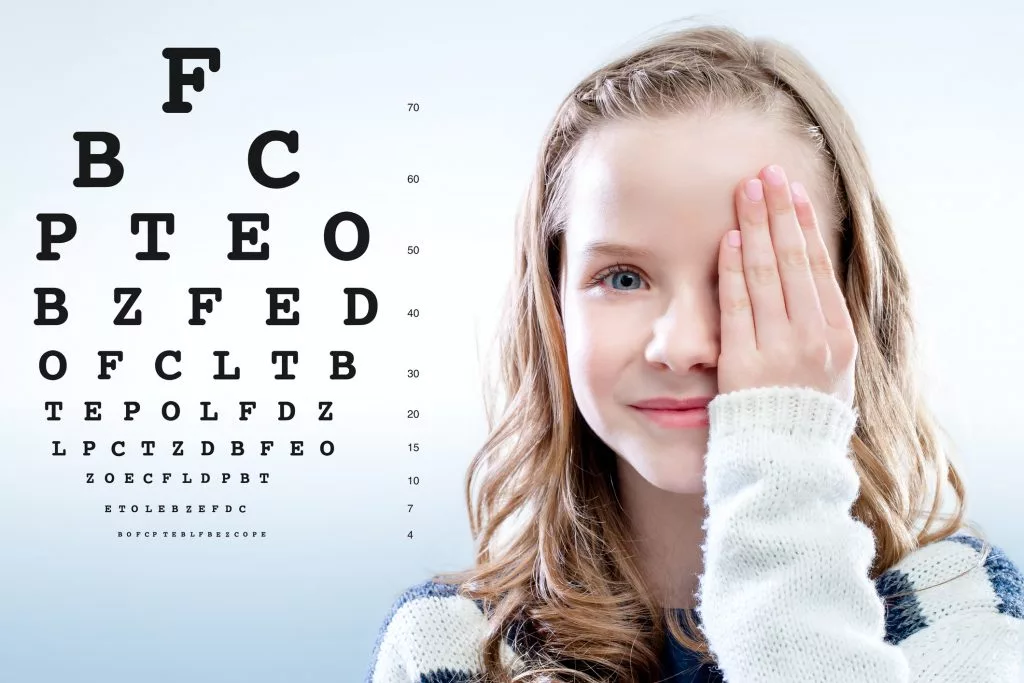Everything You Need to Know About Eye Exams
What is an eye exam?
An eye exam, also known as an eye examination or eye check up, is a comprehensive assessment of the eyes and their overall health, performed by a qualified eye care professional, such as an optometrist or ophthalmologist. The main objective of an eye examination is to evaluate visual acuity, detect and manage eye conditions or diseases, and determine the need for corrective measures like glasses or contact lenses.
It involves a series of tests and evaluations to assess various aspects of ocular health and visual function, providing a thorough evaluation of the eyes’ well-being. Regular eye examinations are essential for maintaining good eye health and preventing vision problems, as many eye conditions and diseases can develop without obvious symptoms. The frequency of eye examinations may vary based on age, risk factors, and existing eye conditions, and your eye care professional will advise you on the appropriate schedule for follow-up examinations.

what happens during an eye exam?
During a routine eye exam, an eye care professional, such as an optometrist or ophthalmologist, will evaluate the health of your eyes and assess your vision. The exam typically includes several standard procedures to check for any potential vision problems or eye conditions. Here’s an overview of what usually happens during a routine eye exam:
Medical history review: The eye care professional will start by asking you about your medical history, any existing eye conditions, medications you may be taking, and any relevant family history of eye problems.
Visual acuity test: You’ll be asked to read letters or numbers from an eye chart to determine how well you can see at various distances. This test helps assess your visual acuity and if you need corrective lenses.
Refraction test: If your visual acuity is not optimal, the eye care professional may perform a refraction test to determine your exact eyeglass prescription. This helps in prescribing the right lenses to correct any refractive errors like nearsightedness, farsightedness, or astigmatism.
Eye alignment and movement test: The doctor will check how well your eyes work together and assess if there are any issues with eye alignment or muscle movements. This test is essential to identify conditions like strabismus (crossed eyes) or amblyopia (lazy eye).
Slit-lamp examination: A slit-lamp is a special microscope used to examine the structures of the front of the eye, including the cornea, iris, and lens. It helps detect conditions like cataracts, corneal abrasions, or conjunctivitis.
Pupil dilation: In some cases, the eye care professional may dilate your pupils using eye drops to get a better view of the back of your eyes. Dilated pupils allow them to examine the retina and optic nerve for signs of diseases like glaucoma, macular degeneration, or diabetic retinopathy.
Tonometry: This test measures the pressure inside your eyes to check for glaucoma, a condition caused by increased intraocular pressure that can damage the optic nerve.
Color vision test: This assesses your ability to differentiate colors and helps identify color vision deficiencies, such as color blindness.
Visual field test: It evaluates your peripheral vision to detect any blind spots or signs of certain neurological conditions.
Additional tests: Depending on your age, medical history, and any specific symptoms or concerns, additional tests may be performed, such as retinal photography, optical coherence tomography (OCT), or visual evoked potentials (VEP).
After the exam, the eye care professional will discuss the results with you and recommend any necessary treatments or prescriptions, such as eyeglasses, contact lenses, or further medical interventions if any eye conditions are detected. It is essential to have routine eye exams, even if you do not experience any vision problems, as many eye conditions can develop without noticeable symptoms. Regular check-ups help maintain good eye health and prevent potential vision loss.

Who should have an eye exam?
Everyone should go for an eye exam, regardless of age or visual acuity. Regular eye exams are essential for maintaining good eye health, preventing vision problems, and detecting potential eye conditions or diseases early on. Here are some specific groups of people who should prioritize getting regular eye exams:
- Children: Pediatric eye exams are crucial for detecting and managing vision problems, amblyopia (lazy eye), and other eye conditions that may affect a child’s development and learning.
- Adults: Regular eye exams for adults help monitor visual acuity, screen for refractive errors, and detect or manage eye diseases such as glaucoma, cataracts, and macular degeneration.
- Seniors: Older adults benefit from comprehensive eye check-ups to address age-related eye conditions and assess their eye health in the context of overall health issues.
- Individuals with Vision Problems: People experiencing changes in vision, such as blurriness, double vision, or eye strain, should have their eyes checked to determine if corrective measures are needed.
- Those with Family History of Eye Diseases: Individuals with a family history of eye conditions should have regular eye exams to monitor for any signs of hereditary eye problems.
- Individuals with Chronic Health Conditions: People with systemic diseases like diabetes or hypertension should have regular eye check-ups as these conditions can impact eye health.
- Individuals with Eye Injuries or Eye-Related Symptoms: Anyone experiencing eye injuries or sudden changes in vision, eye pain, or other concerning symptoms should seek immediate eye examination.
- Contact Lens Wearers: People who wear contact lenses should have regular eye exams to ensure their lenses fit properly and to monitor eye health, as contact lens wear can increase the risk of certain eye conditions.
- Individuals with High-Risk Jobs or Hobbies: Those engaged in activities that pose potential risks to the eyes, such as jobs involving prolonged computer use or exposure to hazardous materials, should have regular eye exams to monitor for any eye-related issues.
- Pregnant Women: Pregnant women may experience changes in vision due to hormonal fluctuations, making regular eye exams important during pregnancy.
Remember that early detection and timely intervention can significantly impact the success of managing eye conditions and preserving good vision. Regular eye exams play a critical role in maintaining optimal eye health and overall well-being. The recommended frequency of eye exams may vary based on age, risk factors, and existing eye conditions, and it’s essential to follow the advice of your eye care professional for a suitable examination schedule.
How often should you have an eye exam?
Adults should have comprehensive eye exams every two years if there are no complaints. However, if you’re 60 or older you should have your eyes checked once a year to make sure you are seeing as well as you should.
Children who have regular vision screenings need to schedule an eye exam less often. The main goal is to identify children at risk of developing amblyopia, which can lead to permanent visual impairment when discovered after the age of 7.
Other problems that can be detected by screenings or eye exams include strabismus (eye misalignment), cataracts, glaucoma, ptosis (drooping eyelid), refractive errors such as myopia (nearsightedness), hyperopia (farsightedness) and astigmatism, and other serious conditions such as tumors or neurological diseases. It is therefore recommended that children have an eye exam at the age of 6 months, 3 years and then when entering first grade at the age of 5 or 6.
Where can you get an eye exam?
At European Eye Center where we are dedicated to ensuring your clear vision and optimal eye health. Our experienced and caring team will guide you through a comprehensive eye exam tailored to your needs. Using cutting-edge technology, we provide precise results and personalized recommendations. Our services cater to all ages, from children to seniors, ensuring everyone receives the attention they deserve.
Beyond vision assessment, our exams offer insights into your overall health. Early detection of systemic conditions is possible through our thorough examinations. We celebrate the uniqueness of each patient, providing utmost care and respect. Our friendly staff ensures a comfortable and stress-free experience.
Invest in your eye health today and schedule your exam with us. Let us be your trusted partner in preserving your precious gift of sight
Why eye exams are important ?
1. Eye exams help children succeed in school
Did you know that 80 percent of what children are expected to learn in and outside the classroom requires good vision? That statistic, which has been around for a long time, probably should be revised upward because of the ever-increasing amount of screen-time kids are exposed to these days.
An annual eye exam is the only way to ensure your child is seeing clearly and comfortably to succeed in the classroom. It’s also the only way to know for sure if kids are seeing their best for sports and other activities, too. It is essential to check children’s vision when they are first born and again during infancy, preschool and school years.
2. Myopia Detection and Management
Yes, regular eye exams can help in the early detection and management of myopia (nearsightedness). Myopia occurs when the eye’s focusing power is too strong, causing nearby objects to be seen clearly, but distant objects to appear blurry.
During an eye exam, the optometrist or ophthalmologist will assess your visual acuity and refractive error, which includes measuring the extent of your myopia. If myopia is detected, the eye care professional may prescribe corrective lenses, such as eyeglasses or contact lenses, to help you see clearly.
3. Vision screenings are no substitute for an eye exam
Too often, parents are led to believe their child is seeing perfectly well because she passed a school vision screening. Or adults think they see perfectly because they pass a vision screening at the motor vehicle department. Frequently, neither of these assumptions are correct.
Vision screenings are just that — they screen out individuals who have serious (and usually quite obvious) vision problems. Screenings can identify apparent problems a person might have with specific visual tasks, such as seeing a chalkboard clearly in the classroom or recognizing road signs and other objects from behind the wheel.
Only a comprehensive eye exam by an optometrist or ophthalmologist can ensure your vision is as clear and comfortable as possible — and that you’re free from potentially serious eye diseases that don’t have obvious early symptoms, including glaucoma and even eye cancer.

4. Glaucoma detection
Of all serious eye diseases, glaucoma is probably the sneakiest. That’s because there are no discernable symptoms in most cases of early glaucoma — nothing to alert you that something’s going wrong.
People who fail to have routine eye exams and develop glaucoma typically become aware of it only after they’ve sustained permanent vision loss from the disease. And by that time, controlling glaucoma to prevent additional vision loss can be very difficult. Without successful control with medical treatment and/or glaucoma surgery the disease can lead to blindness.
Early detection of high eye pressure and other risk factors for glaucoma is possible only with routine eye exams. Vision screenings do little to nothing to identify or prevent glaucoma.
5. Annual eye exams can detect other serious health problems
Did you know that many people first learn they have serious health conditions such as diabetes, high blood pressure, high cholesterol and even cancer from — yes, you guessed it — a routine eye exam.
Our eyes have been called “the window to our soul.” It turns out, they also are often a very effective window to our overall health.
During a comprehensive eye exam, your eye doctor can observe and evaluate the health and condition of the blood vessels in your retina, which are a good predictor of the health of blood vessels throughout your body. Conditions such as diabetes, hypertension and hypercholesterolemia all are visible by changes in the appearance of the retinal blood supply and blood vessels.
Annual eye exams are especially important for anyone with diabetes or who might be at risk for the disease (due to obesity, family history or other reasons). People with diabetes or pre-diabetes are at risk for developing diabetic eye disease, the leading cause of blindness among adults. In its early stages, diabetic eye disease has no visible symptoms; only a comprehensive eye exam can detect signs of the disease so treatment can begin soon enough to prevent vision loss.
Also, research is advancing to develop an eye test to determine your risk for Alzheimer’s disease, that may soon be performed during a comprehensive eye exam.
